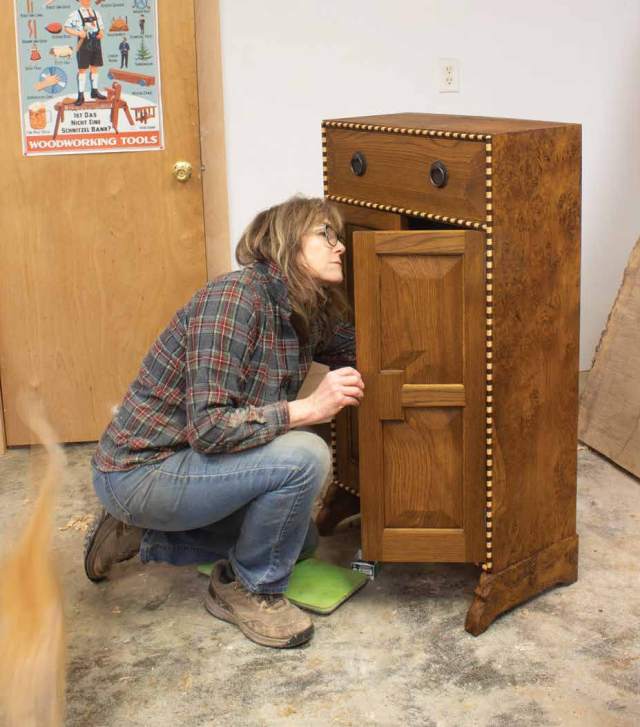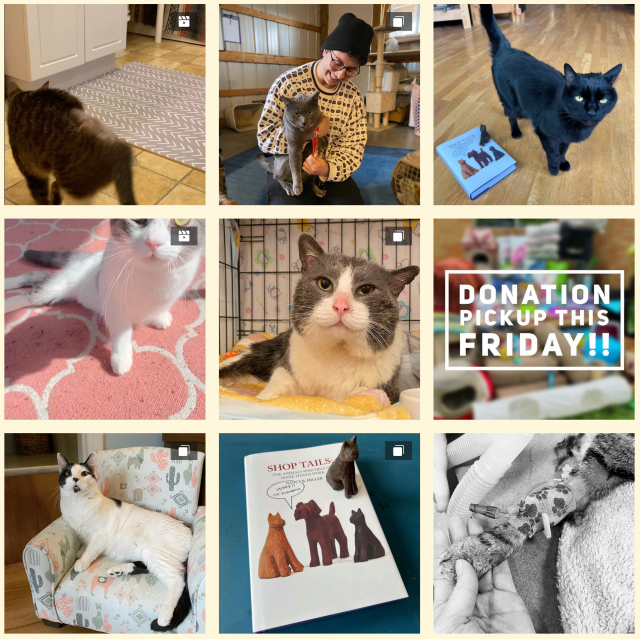
walnut-and-maple beading and hardware in walnut, based on Gimson’s original
1919 design for a sideboard for Guy de Gruchy in “Ernest Gimson: Arts & Crafts
Designer and Architect.”
This is an excerpt from “Shop Tails: The Animals Who Help Us Make Things Work” by Nancy R. Hiller.
Nancy Hiller’s “Shop Tails,” a companion book of essays to “Making Things Work.” “Shop Tails” is different from “Making Things Work” in that it is structured around the animals that came in and out of Nancy’s life, with each chapter focusing on a different one (or several different ones). The animal tales are sandwiched between some serious existential and biographical content provoked by her diagnosis of pancreatic cancer, and all of it is interwoven with true stories about non-human animals, in addition to reflections on how much they taught her about life, love, illness, expectations, parenting, and death.
I continued to run up against the crucial big-picture question that so many books and articles told me I had to answer: What was I living for? What gave me joy? I still had no satisfactory response. Looking back over my life while fitting doors and discussing next steps with my oncologist from the top of a ladder as I painted cubbies for sheet music and CDs, I realized that I had rarely been motivated by a vision or a dream. I could recall few well-defined goals or desires. Sure, I had a basic three-fold vision: Do good work, make a home, have a happy partnership. But this was just an outline that would take a lot of filling-in. Why was I so vague about what I wanted?
In part, I realized, it was because I was raised not to want, but to be grateful for what already was. I worked at being happy, whatever situation I faced, and went from one situation to another without any real plan. When my mother told 8-year-old me that wanting things would make me unhappy, she was probably not referring to the important stuff, but to the latest toys we saw advertised on TV. But you can’t really predict what a kid will do with the Buddha’s First and Second Noble Truths, which, in a nutshell, see all life as suffering, and suffering as a product of selfish desire. I don’t recall any discussion about the need to envision my future, let alone plan my studies around my need to earn a living. Sometimes I was happy. Sometimes I was miserable. But eventually something would change and things got better. Only in my 30s, when I was reading Socrates, Plato and Aristotle in graduate school, did it dawn on me that desire can be among the most powerful motivations for good; what matters are the nature of that desire and its goal.
In place of motivation by well-founded desire, I had spent my life in search of validation that I didn’t get at home. Growing up, it seemed my sister and I were constantly being urged to be other than we were: Hold in your stomach, don’t slouch, don’t whine, get off your backside and do your chores – much of it the typical, benign work of training Baby Boomers for adulthood. The critical messages far outweighed any expressions of approbation.
My sense of never doing or being enough was only worsened by the father figures introduced to our household in the aftermath of our parents’ split. When I was 14, our mother’s boyfriend, George, told me I had a naturally down-turned mouth and should make an effort to smile, lest my face put others off. He said I was getting fat (I wasn’t) and should go on a diet, so I ran with that and developed an eating disorder. He told me I knew nothing – true, relatively speaking, but how does angrily hurling “You know nothing!” at a teenager really help matters? (Answer: It doesn’t. There are more precise and effective ways to make the point about youthful over-confidence versus lack of life experience.) His general demeanor was that of a smug, entitled guy who had put his degree from Oxford to profitable use by getting a job in law or finance in London and resented the intrusion of his girlfriend’s teenage daughters on what would otherwise have been his uninterrupted “me time.” I recognized his bitterness as evidence of his own unhappiness, but his words had lasting effects.
So when this arrogant man who arrived at our doorstep a few times a week, only to be ushered into a comfortable chair and handed a drink to enjoy while he read the evening paper, promised me 5 pounds for every A I got in my O-Level exams, I happily stuck it to him. I’d already experienced the satisfaction of earning good grades in middle school and realized I had the power to view my teachers less as unreasonably demanding authority figures than as partners in my education; I would do my best for them, as well as myself, not least because at the slightest imposition of real discipline, most of my fellow students complained. It had to be tough, being a teacher.
I lived by my As and A-pluses, my 10s-out-of-10. With every one, I felt better about myself and hoped that my teachers felt better about themselves, too. I worked hard to get into the University of Cambridge, only to discover, once accepted, that I had no idea why I was really there, even though I loved the day-to-day life of a scholar. What mattered most to me, I’m embarrassed to say, is that I got in – and with an honorary scholarship. No one could ever again call me lame-brained, even though my stepfather would do his best to prove my intellectual inferiority to his own sophistication in argument and repeatedly called me “useless” to my face. The same went for university after I returned to the States. I was determined to graduate Phi Beta Kappa, as my mother had. And I did. But again, in grad school, I was struck by the realization that I really had no idea why I was there, beyond my awareness that I enjoyed learning, having my mind lit on fire by new perspectives, and proving my ability to excel. In the end I did not want the life of a professional academic. And the most oft-cited alternatives for those with a doctorate in ethics, which I had planned to pursue, were nothing I wanted, either; I had no interest in being an ethics advisor to some big corporation, a job that too often means circumventing profit-diminishing foundational moral stances through arguments on behalf of ethical exceptions. What I wanted, for 50 years, was to prove that people were wrong about me, to exceed their low expectations. When people mentally translated my work as a furniture maker to “She makes ‘furniture’ out of pallets or fruit crates and decorates her work with cut-outs of ducks and bunnies – you know, because that’s what women like,” I would show them my take on an Edwardian hallstand with a perfectly fitted door and drawer and a cornice of compound bevels. Anyone who assumed that, as a tradesperson, I would be less intellectually curious and articulate than someone who works in an office (any kind of office would do; this is a matter of longstanding prejudice against “manual” and “blue-collar” workers) would have to square that assumption with a growing body of published essays and books in which I brought my academic training in Classical languages, history and ethics to bear on the social and economic significance of commonplace things such as kitchen furnishings. I did my best to illustrate the ways in which a house, typically thought of as “property,” could fulfill many of the roles we usually associate with a human partner. In response to the critics who might deride my ways of putting cabinets together, I would point out that there really are as many ways to build a cabinet as there are cabinetmakers, not to mention that the cabinets I build, however simple their construction, are far stronger than most that are commercially made.

with locally quarried limestone counters. (Photo: Spectrum Creative Group.)
Throughout all of this, I now saw, I had moved forward in reaction to others. I was dangerously dependent on outside forces, people who expressed their opposition, no less than their approval. It suddenly felt deeply exhausting. I let my awareness of that exhaustion sink in. Whatever might happen with the course of my cancer, I was not going back to my old ways of living.
To be fair, those other-influenced decisions always reflected something of me – a love of houses, gardens and animals; an intellectual fascination with the endless ways in which people make meaning out of the seemingly random circumstances into which we are born; a desire to make myself a home. But viewing the span of my working life as a whole, I was staggered by a deep, yet vague sense that I had always been running away. What was I running away from – the person I was not, but was too often taken to be?







